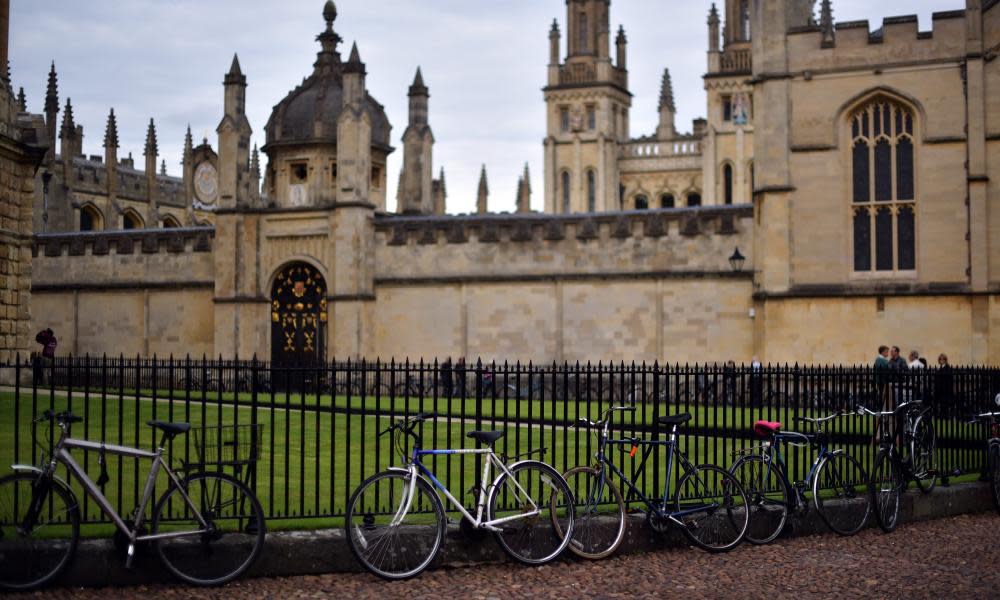Black students on Oxbridge: 'we need to change the narrative'

Oxford and Cambridge must engage with students at a much younger age, and state schools should better prepare their students for elite colleges, black British Oxbridge students say.
Hope Oloye, 20, from Newham, east London, is the only black biomedical student in her year at Oxford. She only considered applying after being encouraged to do so by a tutor at her comprehensive.
“My head of sixth form, who grew up in a council estate and went to Cambridge, called my mum in to speak to her, and helped everyone with all Oxbridge applications. He made the applications with us and made sure we weren’t alone. He was really hands-on and dedicated. I just want black students to think they’re good enough,” Oloye said.
Data shows that 10 of the 32 Oxford colleges did not award a place to a black British pupil with A-levels in 2015 – the first such figures released by the university since 2010. Oriel College has offered one place to a black British A-level student in six years.
Similar data released by Cambridge revealed that six colleges failed to admit any black British A-level students in 2015.
Oloye said: “Oxford is completely different to Newham in every way. I expected it to be, but it was definitely a culture shock. It’s beautiful and calm, but it’s a lot less diverse. The people I’ve come across are friendly and open, and from all over the UK. But there’s definitely lots from the north London bubble. What weirded me out at first is that they all knew each other. I thought, where do you know each other from?”
Oxford said students from black and minority ethnic backgrounds made up 15.9% of its 2016 UK undergraduate intake, up from 14.5% in 2015, and that offers to black students had more than doubled since 2010. Those figures include British Asian students and other minorities.
Oloye said she was often the only black person in a room and felt at times that she could be perceived as representative of her race.
“If I act badly, for example, it may reaffirm that black women are aggressive. I don’t think people do that intentionally, but I may be the only black woman these tutors have come across. I need to make sure the tone isn’t off. I’m hyper-aware that I’m hyper-visible” she said.
Cambridge spends £5m a year on access measures including work with black and minority ethnic school pupils. The Oxbridge students who spoke to the Guardian said more needed to be done to engage with students at a younger age.
Ssegawa-Ssekintu Kiwanuka, who graduated with a degree in chemical engineering from Cambridge in 2014, was one of only two black British students on his course. He said access schemes were failing because they targeted GCSE students and above, when it may be too late to help.
“You have to sit the right GCSEs, they’ve got subjects, and it needs to be started earlier. They need to look at kids from 13. If we look at it like Premier League footballers, they’re getting trained from early on,” he said. “We’re having a go at Oxford and Cambridge but we need to look at society too – there is not enough focus on access.”
Kiwanuka, now a musician known as Love Ssega, whose career began with the group Clean Bandit before going solo, only applied to Cambridge because his dad contacted Bambo Akani, a black British Cambridge student who featured in a BBC documentary.
“The image of black British boys is so bad. You’re always walking on eggshells, you’re scrutinised. That negativity is a big problem. Bambo was an older mentor, this is what we need: if there’s just one person to inspire you. If you’re a minority, you know you’re going to be a minority. I was able to talk to him, and he told me I’ll have a good time and work hard.”
Kiwanuka added: “We need the Obama effect over here. You see Michelle Obama and you see they’re not acting up, they didn’t get kicked out. The Obamas did the presidency. We need to change the narrative. Then people are not going to be scared.”

 Yahoo News
Yahoo News 
